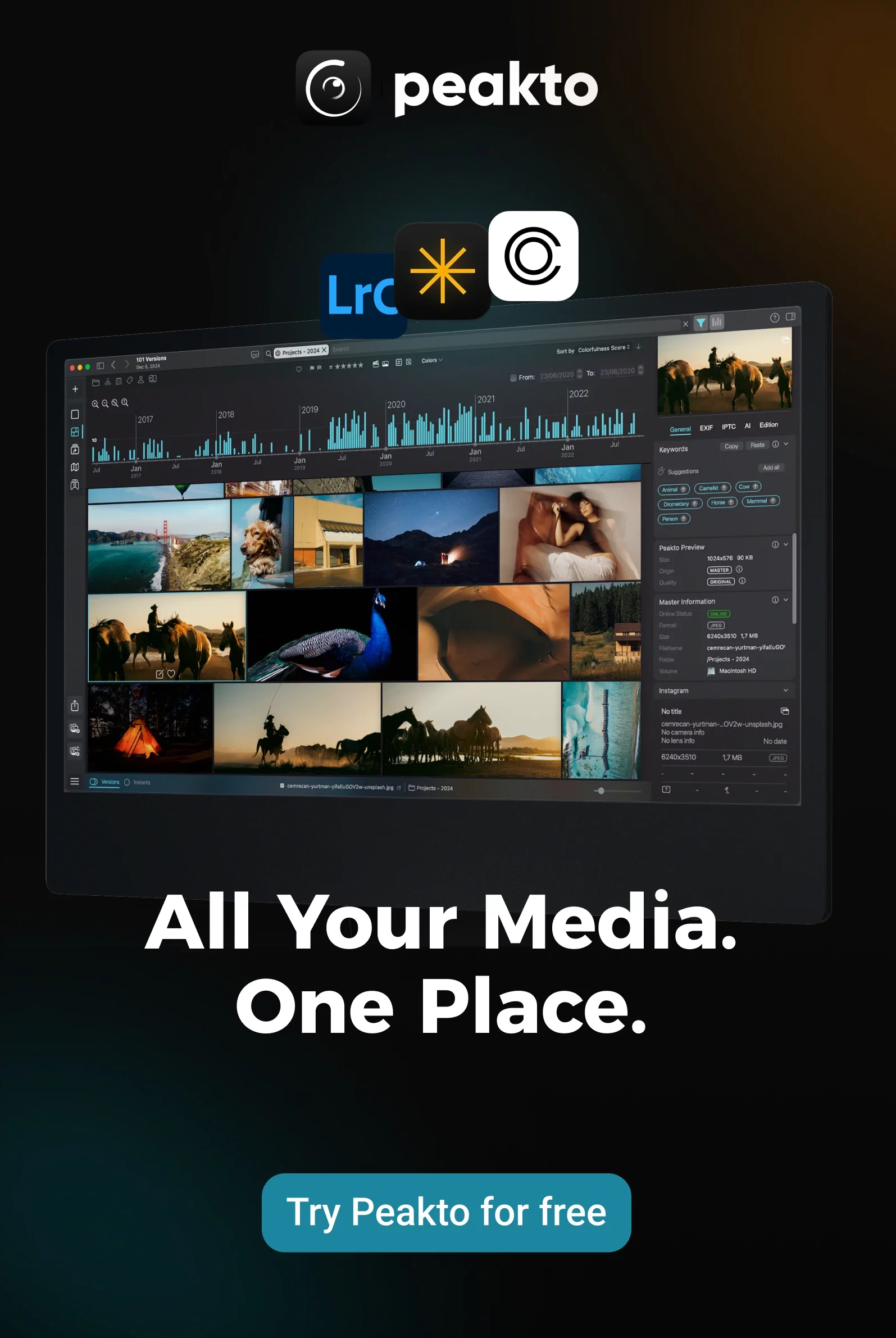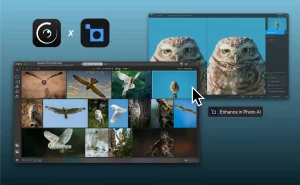Creating an online gallery is a game-changer for photographers. It allows you to showcase your work in a professional, accessible way, anytime and anywhere, while attracting new clients. It’s one of the most effective ways to increase your online presence and even sell prints. Simply put, it’s a must-have tool for any serious photography business.
But like any great opportunity, it comes with its challenges. How do you choose the right platform—one that’s easy for both you and your clients to use, yet delivers a polished, professional look? How do you organize your gallery to make it both visually stunning and high-performing? What guidelines should you follow to select your best shots while maintaining a cohesive visual style? And finally, how do you keep your gallery fresh and up to date? In this article, we’ll answer all of these questions and walk you through each step of the process.
What is an Online Photo Gallery?
An online photo gallery is a digital space where photographers can showcase and sell their work. A gallery can be private, meaning it’s accessible only to specific clients who have commissioned a professional photographer for a project—like a wedding, for example. It can also be public, allowing the photographer to exhibit their work, make it accessible to a broader audience, and, if desired, offer it for sale.
An online photo gallery allows photographers to present their images in a well-organized, professional, and visually appealing manner. It enables the display of collections or portfolios, which can be categorized by theme, project, or style. Visitors can easily browse through the photos, view them in high resolution, and, if the photographer chooses to offer it, purchase prints and other products.
Beyond simply showcasing photos, an online gallery serves as a strategic tool for selling artwork. It functions as a fully-fledged online store, perfectly suited for selling photography. By offering prints and other products directly through the platform, a photographer can generate sales at any time, from anywhere in the world. It’s a professional and effective solution to boost visibility and monetize talent.
Why is Having an Online Gallery Important?

1. An Online Photo Gallery for Creating a Portfolio
An online portfolio is a photographer’s digital business card. It allows you to centralize and present your work in an organized, professional manner. Unlike printed portfolios or social media, an online gallery offers full customization, enabling you to control the look and feel of your site to best reflect your unique style. Plus, your online portfolio is accessible 24/7, from anywhere in the world, making it easy for clients, galleries, and potential partners to discover your work without any geographical or time constraints. Having an online portfolio not only showcases your expertise but also signals your commitment to your craft.
If you specialize in specific types of photography, it’s wise to create a separate portfolio for each theme, curating your best shots and ensuring visual consistency across your selections. Potential clients often seek photographers based on particular specialties, so highlighting each niche with a dedicated portfolio can help them envision working with you for future projects. Additionally, clients might see your work in one area and imagine how you could capture important events in their own lives. Of course, you can easily integrate one or more portfolios into your main website, giving visitors a seamless experience to explore your range of expertise.
2. An Online Gallery to Share Your Images with Clients
An online photo gallery platform allows you to create private galleries for specific clients, maintaining a direct and personalized relationship with them. An online gallery makes it significantly easier to share your images with clients. Instead of sending large files via email or relying on file transfer services, you can invite your clients to visit their personal gallery, where they can view, download, or order prints of the images they love. This offers a smoother, more impactful, and professional viewing experience, with your photos displayed in the best possible light—while also strengthening your brand image.
Additionally, an online gallery allows you to control access to certain images (for example, only the newlyweds can view the most intimate photos, while other guests may not have access). It’s a convenient solution that enhances the client experience while saving you time. Another benefit: by integrating these galleries into your website, you drive traffic from clients eager to see their photos, which also improves your SEO.

3. An Online Photo Gallery to Sell Your Images Directly
An online gallery can also be a powerful tool for selling your images to a wider audience. By incorporating e-commerce features, you can turn your gallery into an online store, allowing visitors to purchase your work with just a few clicks. Whether it’s selling prints, high-quality products like fine art prints or framing, or high-resolution digital files, an online gallery offers a simple and effective way to monetize your craft.
Moreover, this allows you to manage sales directly, without any intermediaries, while reaching an international audience. An online gallery optimized for sales helps you build a new revenue stream and expand your reach all at once.
Who Should You Target with Your Online Gallery?
Before selecting your images, take the time to define a few key elements:
- Your target audience: Clearly identify who you’re speaking to. Are you targeting art enthusiasts, professionals looking for a photographer for events, or individuals wanting to capture personal moments? The images you choose should cater to the tastes and expectations of this audience. For instance, professionals will be drawn to images that showcase your technical skills, while a broader audience may appreciate photos that tell a story or evoke emotion.
- Highlight your strengths: Select images that showcase what you do best. If you excel at portraits, feature photos that perfectly capture the emotion and character of your subjects. If event photography is your specialty, choose images that demonstrate your ability to capture key moments with precision and sensitivity. By displaying your finest work, you build trust in your skills with potential clients or partners.
- Emphasize your style: Your photographic style is what sets you apart from others. Whether you favor minimalist compositions, black-and-white treatments, or a documentary approach, make sure each selected image reflects your unique visual signature. This helps visitors to your gallery instantly understand who you are as an artist and what they can expect from your work.
You can also choose to specialize in a specific niche, such as portrait photography, event photography, or photojournalism. This focused positioning helps you target a specific audience more effectively and stand out in a crowded market. By clearly defining your specialty, you increase your chances of attracting clients who are looking for exactly what you offer.

How to Choose the Right Platform for Your Online Portfolio: 13 Key Factors to Consider
As a professional photographer, selecting the right platform to host your online portfolio is crucial to meeting both your artistic and business needs. Here are 13 important points to keep in mind:
1. Customization and Design
The platform should offer ample customization options, allowing you to create a site that truly reflects your style and visual identity. Look for flexible templates that can adapt to different audiences or goals, along with options to personalize colors, fonts, and layouts. The aim is to ensure a polished, cohesive presentation that aligns with your brand.

2. Ease of Use
Even without advanced technical skills, the platform should be intuitive and user-friendly. It should allow you to easily update your gallery, add new images, and organize your projects without the need for coding. Key indicators of ease of use include:
- A “drag-and-drop” interface.
- The ability to set up and preview a draft version of your online gallery in just a few clicks.
- Not having to start from scratch every time you create a new gallery for a similar type of collection (for example, you might want to apply the same pricing or visual identity to similar types of shoots).
An online photo gallery platform should relieve you of certain tasks, like making your images available, updating your portfolio, or managing orders, so you can spend more time on your art and less on logistics.
3. Image Display Quality
For a photographer, image display quality is paramount. Ensure the platform allows high-resolution photo uploads while striking the perfect balance between fast load times and crisp, clear viewing on screens. Poor display or excessive file compression can undermine the presentation of your work.
4. Loading Speed and Performance
Visitors are often impatient—if your site takes too long to load, they might leave before even seeing your photos. Linked to the previous point, a high-performance platform ensures fast loading times with optimal image display quality.
5. Mobile Compatibility

6. Storage Capacity
7. E-commerce Features
If you plan to sell your photos—whether as digital files, prints, or other products—opt for a platform that integrates a full e-commerce experience. The process of managing orders and payments should be smooth and secure.
Marketing tools to boost sales are equally important. For example, offering discounts based on cart size, product bundles at special prices, or gift cards can help increase sales.
Additionally, being able to reach out to previous customers in bulk, encouraging them to reorder during key periods (such as the holidays), can create valuable opportunities for your business.
Finally, the platform should give you access to relevant and simple analytics—tracking views and sales, so you can get a clear sense of your performance and manage your business effectively.
8. Quality and Flexibility for Your Prints
If you don’t have access to a mini-lab or aren’t used to working with a print lab, offering a variety of prints and products is made much easier by an integrated, high-quality lab within your galleries. Be sure to review the product catalog, including the types of paper used. If the lab is located in France, you can also reduce the environmental impact of printing by cutting down on transportation distances.
If you have your own mini-lab or regularly work with a specific print lab, the gallery platform you choose should allow you to offer the products you want for sale and manage your orders seamlessly.

9. Image Security and Protection
10. Technical Support and Assistance
Ensure the platform provides responsive and accessible customer support in case of problems. This factor is often overlooked initially, but when difficulties arise, having access to a responsive, competent support team via email, and ideally by phone, can make all the difference. Support in your language—such as French—adds extra peace of mind.
Tutorials, FAQs, or even community support groups can also be valuable resources for getting acquainted with the platform or finding answers on your own.
11. Scalability and Updates
As your career progresses, your platform needs to grow with you. Ensure the platform offers flexible plans for different stages of development. It’s also important that the platform provider listens to the needs of photographers and integrates new features that simplify your workflow or support your growth.
However, beware of platforms with an overwhelming number of features that could complicate your user experience. Striking a balance between functionality and simplicity—both for you and your clients—is key to a successful gallery experience.
12. Social Media Integration
13. Cost and Pricing Options
Platforms vary in cost, usually offering a no-subscription model with sales commissions, or monthly/annual subscriptions that become more cost-effective once you reach a certain sales level. Subscriptions often come with more features.
Evaluate your budget and compare what each platform offers based on the criteria listed above and what you actually need. Keep in mind that these platforms are typically quite affordable when compared to other investments you might make as a photographer (such as training or equipment), as well as the time savings and benefits they provide. Choosing the cheapest option isn’t always the best route—carefully assess your needs, as investing in a quality online gallery platform can bring substantial benefits to your business.
Two Essential Tools for Creating Your Online Portfolio as a Photographer
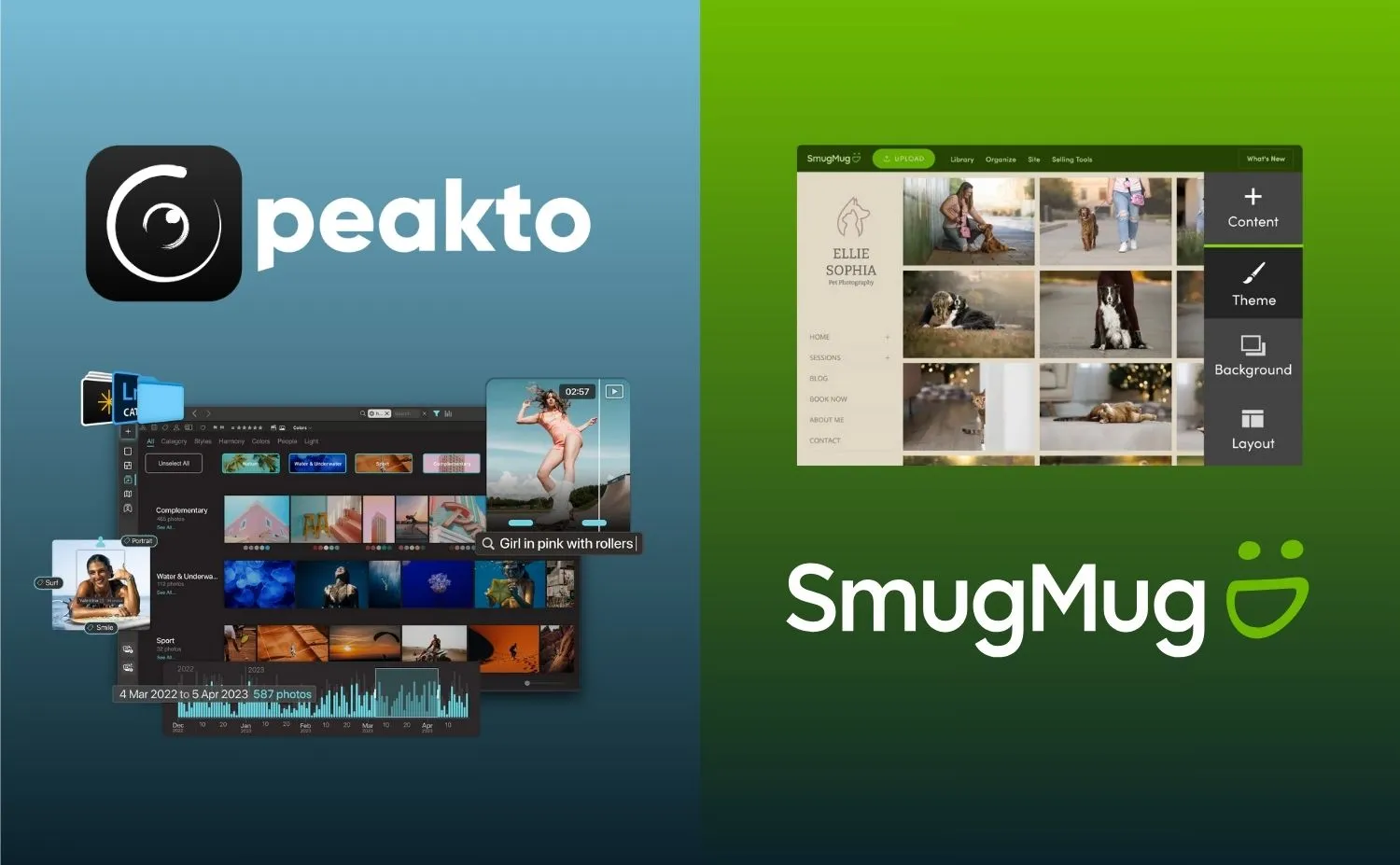
Rediscover Your Best Photos for Your Gallery with Peakto
Finding your best shots isn’t always easy when you have thousands of photos scattered across multiple hard drives or catalogs. Peakto offers a practical solution for gathering all your images on Mac. By connecting your various storage sources—hard drives, folders, editing software, or Apple Photos—you can quickly access all your photos, no matter where they’re stored, in one unified interface.
Once your images are gathered in one place, Peakto’s local AI goes to work: it automates a variety of tasks to help you save time in searching and organizing your content. Automatic categorization, prompt-based searches, and keyword suggestions are just a few tasks the AI handles for you. Peakto offers a comprehensive view and fresh perspectives on your photos, allowing you to rediscover your finest images. It provides four key ways to explore your work:
- Detail View: See each image in full size. Peakto automatically groups different versions of the same photo together. With one click, you can open the original file or locate its precise location.
- Grid View: Peakto doesn’t duplicate your photos but instead generates thumbnails that allow you to see your entire collection at a glance. Filters make this overview even more relevant, which we’ll cover in detail below.
- Panorama View: Peakto automatically categorizes your photos (Nature, Architecture, Portrait…) showcasing your unique talent. Peakto’s AI organizes everything for you, analyzing images locally while keeping your personal data secure.
- Map View: Your images are placed on a map according to where they were taken, offering a new way to explore your work.
- Faces View: Navigate your images based on the people in them, providing a more personal perspective of your portfolio.
With these navigation modes, gone are the days of endlessly scrolling through impersonal folders and files. You can instantly access your images and rediscover hidden gems by shifting perspectives. In addition to this fun exploration, Peakto allows for precision searches using a variety of filters, helping you quickly find exactly what you’re looking for.
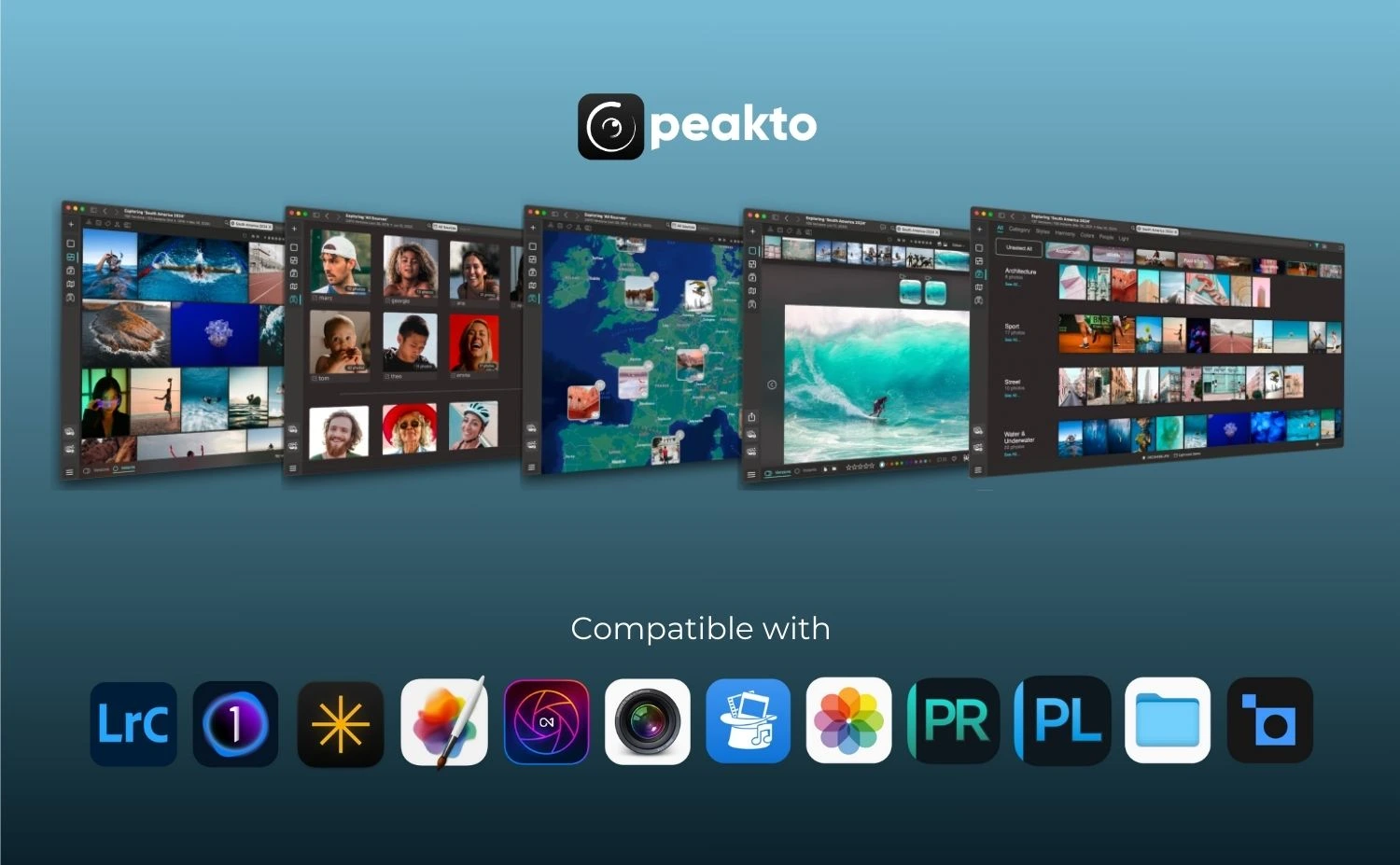
1. Browse Your Best Photos Wherever They Are Located
To make it easier to select the images for your online gallery, Peakto goes beyond simply providing a centralized view of all your creations. It offers a variety of filters and leverages AI to automatically rate and annotate your photos, helping you identify the hidden gems within your catalogs.
2. Filter by Stars and Favorites Already Marked
The advantage of having a centralized hub for all your content, like Peakto, is that you can instantly filter all your images—whether they’ve been annotated in Peakto or another software. You can choose to display only the images rated 5 stars or marked as favorites. Selecting images for your gallery takes just seconds!
3. Use Aesthetic Scores
Thanks to its AI, Peakto is a photo organization software that assigns an aesthetic score to your images. With just two clicks, you can sort all your content by this AI-given score and find the photos that deserve a place in your gallery.
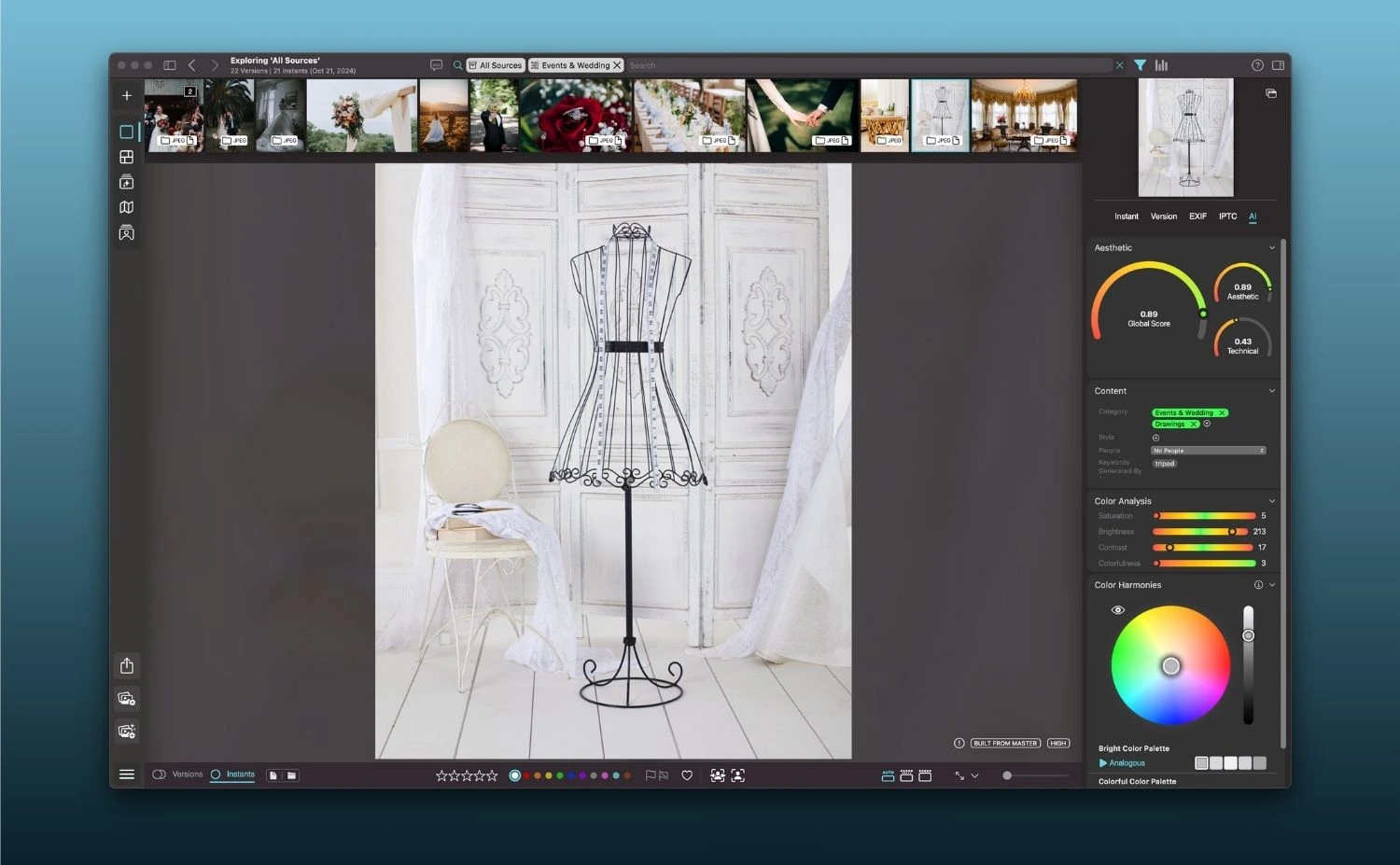
4. Maintain Consistency by Searching for Similar Images
5. Create a Smart Album with Your Favorite Photos
You can gather the best images you’ve selected directly within the Peakto image management app. Either manually create an album to collect photos from various sources, or use Smart Albums, which auto-fill based on the criteria you set.
For example, you can group photos with a rating of 3 stars or higher and those marked as favorites, or even the ones rated highest by the AI. Once your selection is finalized, it only takes a few clicks to export it for your online gallery. With Peakto, you can seamlessly gather all these images from different catalogs and folders into one place.
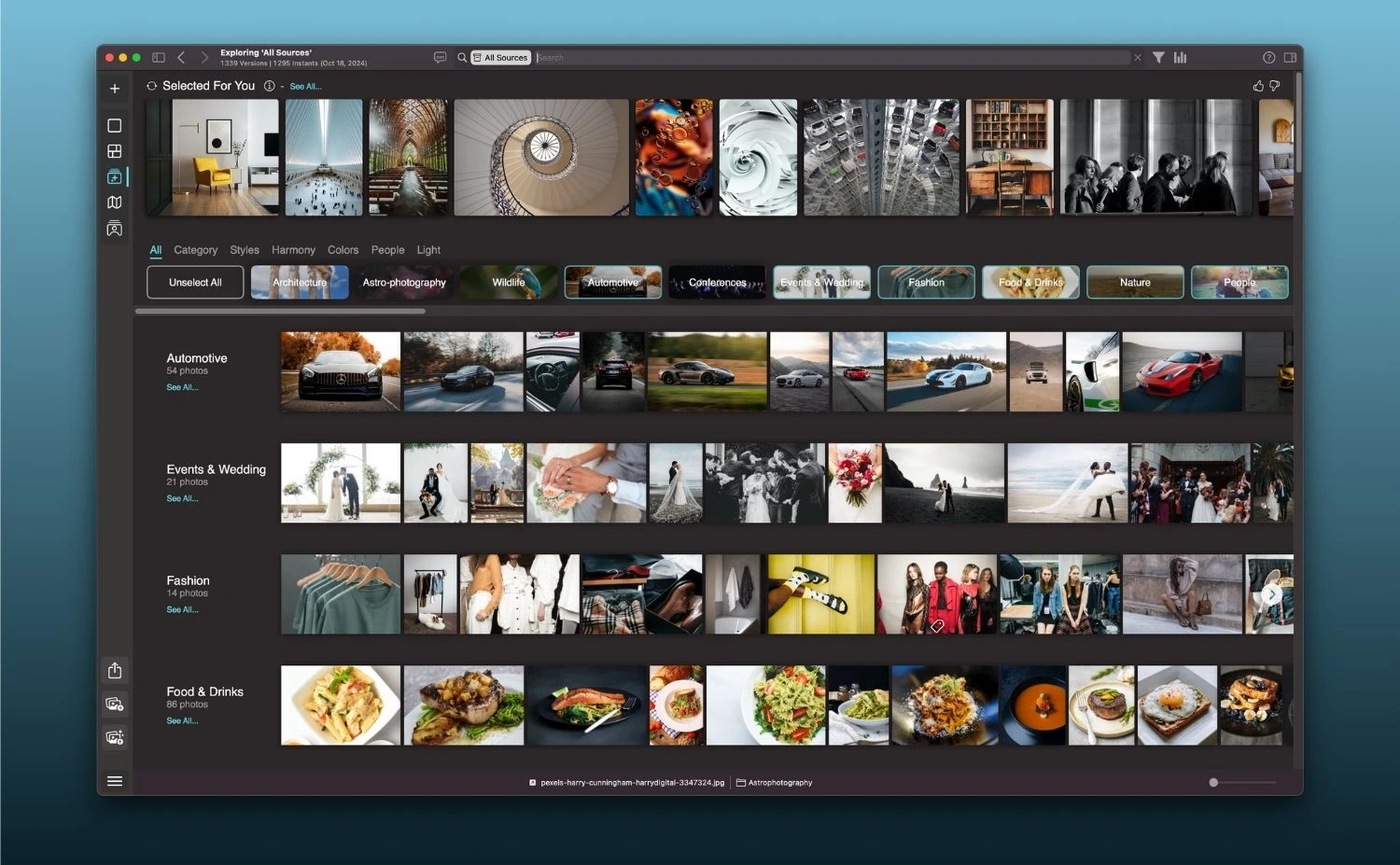
Create Your Professional Online Gallery with SmugMug
SmugMug’s photography website builder offers an easy-to-use platform for photographers to create professional-looking websites. It provides features such as customizable templates, drag-and-drop design, custom themes, and unlimited high-resolution photo storage. With a pro account, users can also sell prints directly through their site. The builder allows for SEO optimization, custom domains, and full HTML/CSS customization for more advanced users.
Key features of SmugMug
- Professionally designed templates.
- Customizable layouts and themes.
- Unlimited photo storage without compression.
- E-commerce tools to sell prints.
- Privacy controls and organized galleries.
SmugMug is tailored for photographers who want a quick setup with options for deeper customization.

Peakto and Smugmug: the perfect duo for professional photographers
In conclusion, having an online photo gallery is essential for photographers looking to showcase, share, or sell their work. It serves as a professional portfolio, a platform to connect with clients, and a tool for generating sales. Choosing the right platform involves considering key factors such as customization, ease of use, image quality, storage capacity, and e-commerce features. By utilizing tools like Peakto to organize your best photos and SmugMug to create a visually stunning online gallery, photographers can effectively present their work and reach their target audience.





